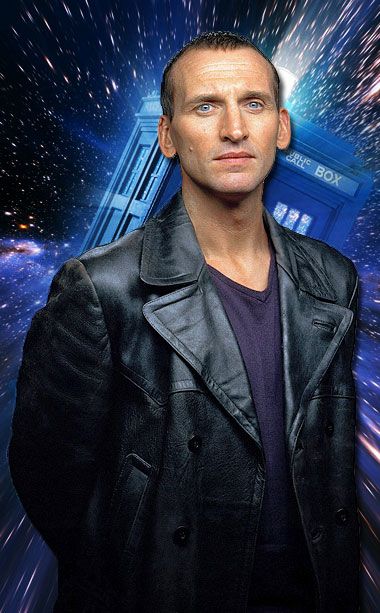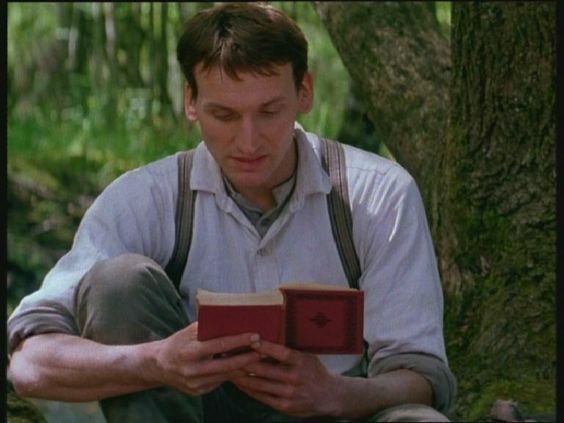Good morning everyone! I hope your day so far is fantastic – absolutely fantastic!
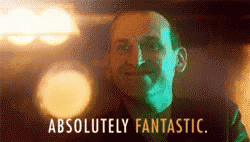
After finally getting my copy of “I Love the Bones of You” by Christopher Eccleston and reading it, it felt proper to rewatch my DVDs of season one of Doctor Who – Christopher Eccleston’s run as the Ninth Doctor. I recently binge watched it and noticed, maybe way later than I should, that despite the show being named “Doctor Who,” the focus of the series is not the Doctor – but Rose Tyler. Let’s take a look episode by episode at the upstaging of Rose over The Doctor. If you have not seen Christopher Eccleston as The Doctor be warned: it’s all spoilers from here.
Episode One: Rose
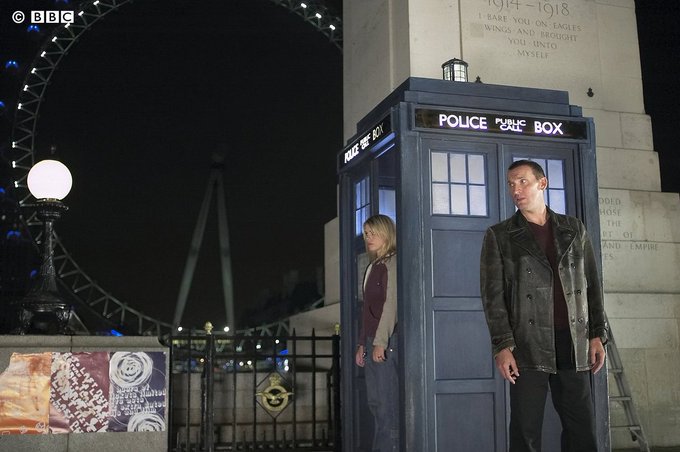
“Lots of planets have a north.”
Rose challenges The Doctor over Eccleston’s Salford accent.
The title alone is a dead giveaway who the story is about. Russell T. Davies allegedly started with Rose and her life before bringing in The Doctor as a means to help the audience relate to the story. The Doctor grabs her hand with “Run” and they escape the shop before the Doctor blows it up. Throughout the focus remains on her. Rose investigates this mysterious traveler whom she chastises like she would a naughty child. Then, when they are in front of the Nestene Consciousness, it’s Rose who saves the day – not the Doctor. She even calls him “useless.”
This is not the way a person should, in my humble opinion, address a Time Lord. Russell T. Davies almost castrates the Doctor with the way Rose treats him, belittling him for not acting like a human would. If that is not enough, RTD makes the Doctor say jokes about Eccleston’s ears in the first fifteen minutes of the episode. If RTD has this low an opinion of both Christopher Eccleston and The Doctor, a person has to wonder why Doctor Who was brought back — and brought back with Eccleston as the lead — in the first place. Neither The Doctor nor Chris Eccleston deserve this opening episode.
Episode Two: The End of the World
The End of the World gives hope that it really is the Doctor in charge and Rose was simply an introduction. Rose goes off on a bit of a tantrum, picks a fight with the Doctor, and mostly ends up trapped on an observation deck while the Doctor saves the day and we learn that he’s called a “Time Lord.” A better opener for Nine and much more fun than “Rose.”
Episode Three: The Unquiet Dead
Written by Mark Gatiss, this episode is so terrifying that I refused to watch it between 2017 and March 2024. Literally gave me nightmares every time because of its creepy ending. Set in 1869 Caerdydd (Cardiff), the Doctor and Rose meet Charles Dickens just when a nightmarish species coming through gas lamps called “the Gelth” decides to visit a reading Dickens is giving of “A Christmas Carol,” on Christmas Eve, of course! Once more the focus becomes Rose, especially as she is the one to connect with Gwyneth (played by Eve Miles of spin-off series “Torchwood”), the simple minded servant girl whose psychic abilities enable her to sense the gelth. Gwyneth sees Rose as the “big bad wolf” and is terrified of her. We also learn more about Rose’s past and how she skipped classes in school to watch boys at the shops.
Gwyneth is the heroine of this story – but it is the Doctor who figures it out.
Episode Four: Aliens of London
I like Aliens of London for Penelope Wilton whom I know best as Isobel Crawley in Downton Abbey. Still disliking Rose, especially on my first watch of Doctor Who, it was Wilton’s Harriet Jones who kept me watching while my brain tried to figure out why Christopher Eccleston looked so damn familiar.
Aliens of London brings us back to the Powell Estate and to Rose’s family and boyfriend Mickey Smith. Rose is nicer to the Doctor than she was in “Rose” and doesn’t disparage him. The slitheen are a middling villain – not too scary – and the story’s plot and rendering is acceptable.
What is refreshing is getting to see more of Nine’s charming personality and his sense of adventure. Without Rose picking on him, the Doctor shows us just how brilliant (or FANTASTIC if you will) he really is. Though the writing is middling, it is refreshing to see the Doctor actually be the hero as he investigates what is going on with the apparent alien invasion.
Episode Five: World War Three
Part two of the story started with Aliens of London, the Doctor uses his wit and charm to save the day – with help from Harriet Jones (Penelope Wilton), Rose, and Mickey. Jackie Tyler scolds the Doctor for allowing Rose to be in the middle of the danger. As you might expect from the previous episodes, the emotional weight is given to Rose, not the Doctor, as she is the one perceived as most in danger. Rose’s mother Jackie attacks the Doctor for Rose’s peril, putting him on defense once more. Never mind that Rose was the one who keeps deciding to put herself in peril. The Doctor is simply living his normal life of traveling and helping where he can.
Happily Mickey is the one who helps the Doctor by firing the missile that kills most of the slitheen before they can destroy Earth, reforming himself in the Doctor’s eyes as more than Rose’s idiot boyfriend.
Episode Six: Dalek
Dalek finally brings Nine into familiar Doctor Who territory. Though seen through Rose’s eyes, here we finally get some solid information about the Time War as the Doctor is confronted very directly with what he did to protect the universe.
Davros claims in season 4 to finally reveal the soul of the doctor, but I think it happens here. The rage the Doctor feels is tangible thanks to Christopher Eccleston’s perfect performance. We understand what the daleks are through the intensity of his responses – which Rose of course criticizes and chastises him for as if he were a naughty school boy.
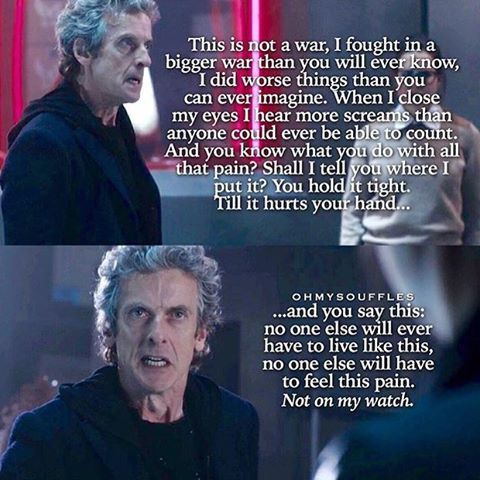
The Twelfth Doctor describes the horrors of war.
Rose’s reactions are not empathetic. She doesn’t process that war is horrible, let alone the consequences to the Doctor for having to kill billions of his own people, including everyone and everything he loves best. If anyone ever needed a Twelfth Doctor talking to, it’s Rose in this episode.
In the quote above, Twelve is expressing exactly what Nine is feeling and what Rose is not understanding in “Dalek.” But more than Nine’s rage at the daleks, we see just how completely stupid Rose is. Time and time again she lets the dalek catch up to her and watches it kill rather than doing the smart thing and running away from it. If she processes that the dalek can and is inclined to kill her, she doesn’t act like it.
Where the dalek is concerned Rose really is a stupid ape! If Rose is supposed to be the Doctor’s equal in all things except science and technology, she blows that theory to bits by not trying very hard to escape the danger posed by the dalek – here and later on. She also falls for Adam Mitchell and insists the Doctor take him with them for the next adventure. One more boyfriend to fawn over.
As before, Rose criticizes the Doctor. This time for hating the daleks. In the “Doctor Who Confidential” for this episode much is made of the competition between Henry van Statten and the Doctor. RTD claims that the Doctor is competing for Rose’s love and attention. But as I discussed earlier, Rose doesn’t need to be there for the pair to lock horns.
Episode Seven: The Long Game
Doctor Who prepares to wrap up Eccleston’s run when the Doctor, Rose, and new boyfriend Adam (from “Dalek”) journey to the year 200,000 to Satellite Five to see Earth at the height of the Great and Bountiful Human Empire. Rose is so boy crazy that she gives Adam both the tardis key and her cell phone and leaves him alone to cause havoc while she and the Doctor investigate why things are not what the Doctor remembers them to be. In this episode Rose is more an equal than the superior she acts like most of the time. Together the Doctor and Rose solve the problem, save the day, and the Doctor undoes Adam’s mischief.
Episode Eight: Father’s Day
As you might expect from the title, this is another episode that is all about Rose Tyler. Rose asks the Doctor to travel back to the day her father Pete Tyler died in a car accident. He complies and she creates a world-ending paradox when she decides to prevent her father from dying in the first place. The episode explores the time Rose spends with her father during the paradox.
Once more the Doctor is barely present and takes a back seat to Rose and her family. While generally a good episode and one that helps us get to know Rose better, it feels a bit out of place for a show where the main character is supposed to be The Doctor – not her. Rose screws up and the Doctor doesn’t really hold her accountable for the damage she does. He’s too quick to forgive and panders.
In the end, it’s Peter Tyler who fixes Rose’s mess and when the timeline is restored, the Doctor returns to take her back into the tardis for another adventure.
Episode Nine: The Empty Child
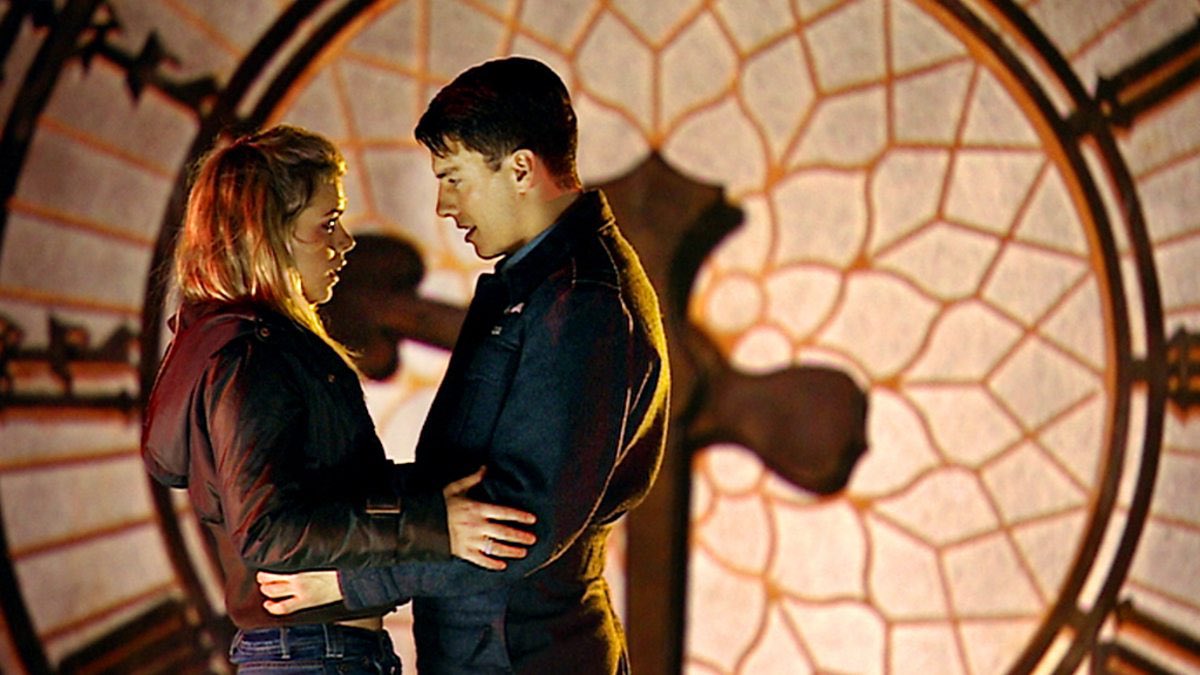
Rose and Jack Harkness discuss “business” from the top of his spaceship
The Empty Child is the first half of another two-parter for the Ninth Doctor. The first time I watched it I had nightmares. This is a Steven Moffat episode and just as creepy as you might expect from his writing.
Set in 1941 during the London blitz, the episode introduces Captain Jack Harkness (played by Jack Barrowman), the “omni-sexual” rogue time agent from the 51st century who can seduce anyone by simply saying “hello” to him/her. While Rose is focused on Harkness’ seduction, the Doctor is focused on undoing Harkness’ mischief and its potentially world ending consequences. A Chula ambulance, part of Harkness’ con, crash lands in London and starts converting people into the image of a small child who died earlier that night in an air raid. The episode ends on a cliff hanger with dozens of converted people converging on the Doctor, Rose, and Harkness, ready to convert them too.
Episode Ten: The Doctor Dances
Mostly because of the ending where the Doctor actually dances (can I cut in and dance with him, please?), this is usually the episode I consider my favorite and it’s in my top 5 for the Russell T. Davies era (Fires of Pompeii being number one for casting Karen Gillian and Peter Capaldi).
We start off where Empty Child ends. “Go to your room!” booms the Doctor, allowing him, Harkness, and Rose enough breathing room to continue their investigation into what exactly happened to cause the plague Harkness triggered. Meanwhile, at the Doctor’s encouragement, Nancy conducts her own investigations. Harkness and the Doctor clash – Russell T Davies says the reason is that each want Rose romantically – and the Doctor figures out the role the nanogenes play in the disaster unfolding around them. As I’ve said before, I don’t think Rose is the actual cause of the testosterone – fulled clashes. The doctor might be “an incredible liar” as Twelve is called later, but he’s firstly a good man, an ethical man and therefore the opposite to Harkness. The Doctor doesn’t like Harkness and doesn’t trust Harkness (life imitating art as Christopher Eccleston didn’t especially like John Barrowman). Nine’s responses to Harkness are therefore the polar opposite to Rose’s.
Despite all this “Rose is the center of the universe” sub-plotting, the Doctor is the one who helps Nancy confess to the Empty Child Jamie that she is not his sister – as she’s claimed the whole time – but actually Jamie’s mother. Nancy embraces Jamie. The nanogenes figure out the connection between Nancy and Jamie and with a joyful shout of “EVERYBODY LIVES!” from the Doctor planet Earth is saved once more.
Happily Rose and the Doctor return to the Tardis for the epilogue. The Doctor remembers he can dance. Rose and the Doctor enjoy 30 seconds of dancing while Jack Harkness looks on jealously.
Episode Eleven: Boom Town
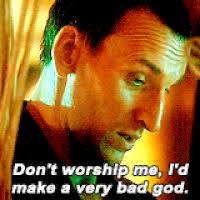
Jack, Rose, and the Doctor land in 2005 Caerdydd (Cardiff) to refuel the tardis with the energy left by the scar created in “the Unquiet Dead.” Mickey Smith joins up with them to see Rose and reignite their relationship only to notice that she’s infatuated not only with the Doctor, but Jack as well who is flirting with both the Doctor and Rose (hence the Doctor’s reply “don’t worship me, I make a very bad god”). Meanwhile, the group discovers that one of the slitheen (Blon) survived the missile Mickey helped launch (following the Doctor’s instructions) in “World War Three” and is plotting to destroy Earth again. The Doctor takes charge of Blon even as her plan clicks into place, opening the rift and causing mayhem. Rose returns to the tardis. Blon explains her plan and almost gets away with it when the Heart of the Tardis opens up and regresses her into a harmless egg. One more step towards the finale.
Episode Twelve: Bad Wolf
We return to Satellite Five – now called the “Game Station” when the Controller seeks out the Tardis from space and time and kidnaps Rose, Jack, and the Doctor in order to stop a fleet of nearly half a million daleks from ending all life on Earth in the year 200,100 – one hundred years after “The Long Game.”
Once more the focus is on Rose – on finding her in “The Weakest Link” and saving her life. That’s the whole of what the Doctor and Jack want. When the Anne Droid appears to kill Rose, the Doctor is visibly shaken and distraught, as if his soul is crushed. Not believable for a time lord – but as this episode is written by Russell T. Davies it is not surprising at this point.
Upon escaping the light Game Station security, Jack Harkness finds the Tardis and figures out Rose is not dead, but transmatted to the end of the solar system and onto a dalek ship. The daleks try to blackmail the Doctor into surrendering by offering him Rose’s life. The doctor refuses and we are all set for The Parting of Ways.
Episode Thirteen: the Parting of Ways
True to his word, the Doctor sets off in his tardis to rescue Rose. Using the extrapolator from Boom Town, the tardis has gained a shield which the Doctor skillfully uses to survive a bombardment of dalek missiles (“And for my next trick”). The tardis materializes around Rose. Instead of escaping right away, the Doctor decides to talk to the dalek to figure out their objectives. Return to Satellite Five and the Doctor and Jack form a plan to save Earth and destroy the dalek fleet. Meanwhile, recognizing the danger, the Doctor tricks Rose back into the tardis and activates his emergency protocols to send her back to London in 2005 – along with a final message to her.
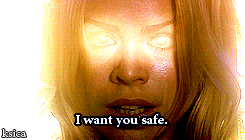
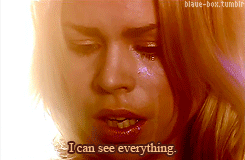
But Rose doesn’t want to be home. She uses what she knows about the tardis to arrange a trip back to the doctor, taking in the Heart of the Tardis – or at least the Time Vortex part of her. Rose destroys the daleks, returns Jack to life (making him immortal in the process), and then starts to die. The Doctor gives her a romantic kiss to withdraw the Vortex, knowing it will trigger regeneration.

Rose wakes to find the Doctor in the early stages of regeneration. The Doctor explains regeneration.
“Before I go, I want you to know: you were fantastic, absolutely fantastic. And you know what? So was I!”
Regeneration takes hold and with a shower of sparks, Nine is gone, replaced with Ten who begins his new life genuinely in love with Rose – which is what she wants. Where Nine is too much a veteran of the Time War to assume human emotions towards her, Ten is Rose’s dream man which she discovers and enjoys in season 2.
Overall season one of Doctor Who should really be called “The many men Rose Tyler fancies” instead of Doctor Who. It’s a year where the Gallifreyan Time Lord and veteran of the Last Great Time War is more arm candy and transportation for Rose than he is the strong adventurer in his own right. Indeed, we don’t really see that powerful and dark, fearsome Time Lord, the true “Oncoming Storm” again until season 8 when Peter Capaldi brings back those darker traits to Doctor Who, at least not very often. Ten and Eleven are very light hearted, very human in most ways, men who try to forget about the Time War. But Nine and Twelve give us a true sense of what it means to survive the horrors of war and it is for that reason that I like Eccleston and Capaldi best.
Many people love Rose and that’s okay. But for me, I want to be awestruck by that greatest of the Time Lords, a man from Gallifrey with the dignity, power, and wisdom of a 900+ year old man who is determined to make the universe better – even if it kills him.


